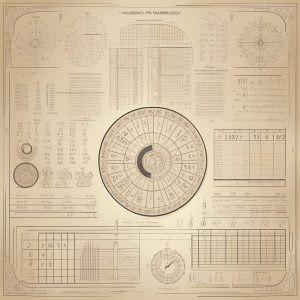What is Numerology and How Does it Work?

If you’ve ever heard someone mention numerology, you might be wondering what it is and how it works. Numerology is the study of numbers and their relationships with people, events, and objects. It’s based on the belief that numbers have a spiritual significance and can reveal information about a person’s personality, life path, and future.
The foundations of numerology can be traced back to ancient civilizations such as Babylon, Egypt, and Greece. The Greek philosopher Pythagoras is often credited with developing the modern version of numerology, which is based on the idea that numbers are the building blocks of the universe and can be used to understand the world around us. Numerology has evolved over time and has been influenced by different cultures, including the Chaldean and Hebrew alphabets, as well as the Latin alphabet.
If you’re curious about numerology and want to learn more, you might have some questions. What kind of information can numerology reveal? How does it work? Is it accurate? In the following article, we’ll explore the basics of numerology and answer some frequently asked questions. By the end, you’ll have a better understanding of this ancient practice and how it might be able to help you gain insight into your life.
Key Takeaways
- Numerology is the study of numbers and their spiritual significance.
- It has its roots in ancient civilizations and has been influenced by different cultures over time.
- Numerology can reveal information about a person’s personality, life path, and future.
Foundations of Numerology
Numerology is a divinatory art that uses numbers and their vibrations to gain insight into a person’s character, personality, and life path. It is based on the belief that numbers have a mystical significance and that they can reveal hidden truths about the universe and its workings.
Core Concepts and Principles
The core concept of numerology is that everything in the universe is made up of energy, and that this energy vibrates at different frequencies. Numbers are seen as the building blocks of this energy, and each number is believed to have its own unique vibration.
Numerologists believe that by understanding the vibrations of numbers, they can gain insight into the energy that surrounds a person, and that this can be used to predict future events and understand a person’s character and personality.
Numerology Systems
There are several different systems of numerology, including Pythagorean, Chaldean, Chinese numerology, and modern numerology. Each system has its own unique approach to numerology, and they may use different calculations and interpretations of numbers.
Pythagorean numerology is the most commonly used system in the Western world, and it is based on the teachings of the ancient Greek philosopher Pythagoras. Chaldean numerology is an older system that originated in Babylon, and it is based on the vibrations of letters in a person’s name.
Chinese numerology is based on the principles of the I Ching, and it uses a system of calculations to determine a person’s lucky numbers and the best times for important events. Modern numerology is a more recent development, and it combines elements of Pythagorean and Chaldean numerology with other divinatory arts.
Numerological Calculations
Numerology uses a variety of calculations to determine a person’s life path number, expression number, and other important numbers. These calculations may involve a person’s name, birth date, or other personal information.
For example, a person’s life path number is calculated by adding together the digits of their birth date and reducing the result to a single digit. This number is believed to reveal important information about a person’s life path and purpose.
Numerology also uses the vibrations of letters in a person’s name to gain insight into their character and personality. Each letter is assigned a numerical value, and these values are added together to create a person’s expression number.
In conclusion, numerology is a divinatory art that uses numbers and their vibrations to gain insight into a person’s character, personality, and life path. By understanding the core concepts and principles of numerology, as well as the different numerology systems and calculations, you can gain a deeper understanding of this mystical practice.
Frequently Asked Questions
How can one’s date of birth influence their numerology chart?
Your date of birth is a key factor in determining your numerology chart. It provides the basis for calculating your Life Path Number, which is one of the most important numbers in your chart. Other aspects of your chart, such as your Expression Number and Soul Urge Number, also rely on your date of birth. Essentially, your date of birth serves as a blueprint for your numerology chart.
Can numerology be considered a scientific practice?
Numerology is not considered a scientific practice in the traditional sense. It is not based on empirical evidence or scientific methodology. However, many people find value in numerology as a tool for self-discovery and personal growth. It is important to approach numerology with an open mind and a willingness to explore its potential benefits.
What connections exist between numerology and astrology?
Numerology and astrology share some similarities, as both use birth information to generate insights about an individual’s personality and life path. However, they are distinct practices with different methods and approaches. While numerology focuses on numbers and their meanings, astrology uses the positions of celestial bodies to make predictions and provide guidance.
What methods are used to calculate an individual’s numerology numbers?
There are several methods used to calculate numerology numbers, but the most common is the Pythagorean method. This method assigns numerical values to letters based on their position in the alphabet and then adds those values together to arrive at a single-digit number. Other methods, such as the Chaldean method, use different numerical assignments for letters.
Could you provide an example of numerology at work in everyday life?
One example of numerology at work in everyday life is the use of house numbers. In numerology, each number holds a different energy and meaning. When choosing a house or apartment, some people may use numerology to select a number that aligns with their personal energy or goals. For example, someone who values creativity and self-expression may choose a house with a Life Path Number of 3, which is associated with those qualities.
What are the primary numbers in numerology that hold significant meaning?
The primary numbers in numerology are 1 through 9, as well as 11 and 22 (which are considered Master Numbers). Each number holds its own unique energy and meaning, which can provide insights into an individual’s personality, strengths, and challenges. The Life Path Number, Expression Number, and Soul Urge Number are among the most important numbers in a numerology chart.
Related Articles in Numerology:
Will Numerology Tell My Future?
Calculate Numerology Chart
Numerology: Predict Love?
Do Numerology Numbers Affect Personality?
Numerology Luckiest Number
Pay Attention to Numerology Meanings
History of Numerology
Numerology Name Meanings
Explaining Numerology Basics
